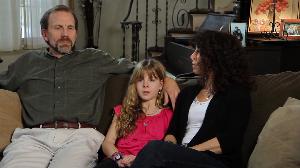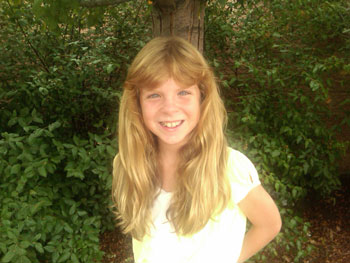|
Always Hopeful Q&A with Abbey Quinn
CR: What were your first symptoms? AQ: I couldn’t make a fist really well. My dad gave me a thumb’s up one day and I couldn’t give one back. He noticed that I couldn’t make a fist all the way, so that’s how we first knew something was up. CR: What was your first reaction when you found out what scleroderma was? AQ: It was really confusing! At first, I was really worried if I was going to die. I had to take medications so I could use my hands and so they wouldn’t get worse. I even had to do physical therapy for a while. It was like the skin on my hands was really tight. You couldn’t pinch the skin on my hands because it was so tight. CR: In what ways has your life changed since you were diagnosed with scleroderma? AQ: Before I started to take medication, I didn’t take any medication. Then, all of a sudden, I had to take 11 pills every Friday night. It was really sudden and I wasn’t used to it. I also had to miss school for the physical therapy. I usually only told people I had a doctor’s appointment. I only told a few friends about what was really going on. It was kinda confusing for them. CR: What was it like telling your story in the awareness video?
CR: What did you think when you saw the final video? AQ: I really like doing drawing so it was cool that another person they talked to was an artist (James Erik Hodson). The school that I go to is a creative arts school and I had no idea they were coming to my school for another interview. I really could connect with his story. CR: What would you tell people about scleroderma if you could just tell them one thing? AQ: I was nervous at first, but realized that it gets better if you do what your doctors tell you. I ask my doctor in Ann Arbor a lot of questions and then there are some websites that are good for information, too. CR: What is your advice for another kid with scleroderma? AQ: I’ve been really fortunate of how well the medication has worked for me. I think as long as you follow your stretches or medications that your doctor gives you, it can really help a lot. There’s also hope. As bad as it may seem, if you do what you can, it can get better. |
|
|
Back
Understanding Scleroderma
Back
Treating Scleroderma
Back
Living Well with Scleroderma
Back
Advancing Research and Treatment
Back
Get Involved



 Twelve-year-old Abbey Quinn has told her story before. This
seventh grader from Michigan was diagnosed in 2010 with linear scleroderma, and
was profiled recently, along with her parents, in a new awareness video that
educates the public about the disease. Abbey, who likes reading, drawing and
playing with her three pets, took some time from her winter break to talk with
“Voice” editor Christina Relacion about what it’s like growing up with
scleroderma.
Twelve-year-old Abbey Quinn has told her story before. This
seventh grader from Michigan was diagnosed in 2010 with linear scleroderma, and
was profiled recently, along with her parents, in a new awareness video that
educates the public about the disease. Abbey, who likes reading, drawing and
playing with her three pets, took some time from her winter break to talk with
“Voice” editor Christina Relacion about what it’s like growing up with
scleroderma.  AQ: I had told so many people my story before. So, it was pretty
easy to tell.
AQ: I had told so many people my story before. So, it was pretty
easy to tell.